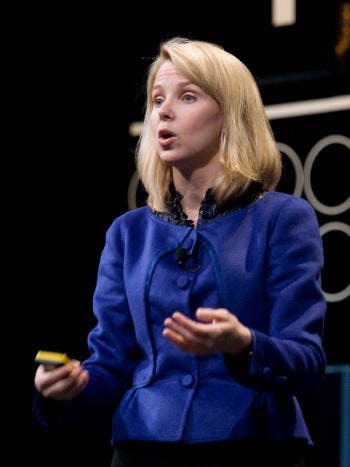“People are more productive when they’re alone, but they’re more collaborative and innovative when they’re together.” — Marissa Mayer, Yahoo CEO
Marissa Mayer maintained a long and remarkable silence in the face of unrelenting criticism of Yahoo’s mid-February “ban on telecommuting.” She let a clumsy HR memo stand in for her views.
Late last week, as gun legislation and the Boston manhunt blanketed the news, Mayer chose to appear at a long-scheduled Great Place to Work gathering of HR professionals and executives in Los Angeles.
Rather than cancel and avoid the inevitable issue, according to news report she came armed with well-prepared lines and graphic support. According to CNN Money, mid-speech she said:
“I need to talk about the elephant in the room.” Immediately an image of a purple elephant, with large while letters “WFH” (work from home) painted on its side, appeared on projection screens in the hotel auditorium.
She repeated a key phrase the company used in a statement it released after the memo was leaked: “It’s not what’s right for Yahoo right now,” and added, “It was wrongly perceived as an industry narrative…”
Mayer defended her decision by first acknowledging that “people are more productive when they’re alone,” and then stressed, “but they’re more collaborative and innovative when they’re together. Some of the best ideas come from pulling two different ideas together.” The shift in policy affects roughly 200 of Yahoo’s 12,000 employees.”
Old ways of managing
I’m sure she sensed that the crowd – or any crowd – was eagerly awaiting her comments on The Great Telecommuting Controversy her actions had unleashed. Sadly, she displayed a purple elephant, but presented a white one. (A “white elephant” is defined as a valuable but burdensome possession of which its owner cannot dispose and whose cost — particularly cost of upkeep — is out of proportion to its usefulness or worth.)
What Marissa Mayer brought to her decision and discussion seems to be a simple and seemingly valid (and valuable) commodity: old ways of managing, including the penchant for empty generalizations.
The old ways have proven successful for many enterprises over decades – and perhaps they will turn Yahoo around. Certainly one does not have to expect a robust defense of telecommuting from someone who was not schooled in it (at Google), does not seem to practice it personally, and saw it as contributing to the mess she inherited.
But a little subtle and far-sighted thinking from a celebrated and well-compensated CEO does not seem too much to ask. Now and in the future, an observer as data-driven as Mayer is reputed to be should recognize a simple fact: Life, work, performance, productivity, engagement, and resilience in a diverse society and workforce demand customization, not uniformity; fluidity, not rigidity; and collaborative management rather than executive-inspired micro-management.
Yes — it all depends
Slightly modifying the words of the memo that animated tens of thousands of opinions, Yahoo’s CEO tossed into the national dialogue this thought worthy of a fortune cookie:
“People are more productive when they’re alone … but they’re more collaborative and innovative when they’re together.”
If this were a question, the answers would be: “yes” and “yes” and “no” and “no,” because, IT ALL DEPENDS.
Serious management demands careful and instructive analysis. Such generalizations as these can have little place in the day-to-day assessments of real managers. Different people, different tasks, different days, different business pressures and cycles – all require discretion in where, when, and how a given person best accomplishes a given piece of work.
Yes, it all depends.
Collaborative scheduling, grounded in reality
Optimizing business outcomes and employee engagement is an ongoing process that demands the actual managing of differences. In our flexibility work with clients, we argue that what people need is not rigid programs and empty generalizations, but collaborative scheduling grounded in reality and managers and employees who have the skills to monitor and adjust to the work process that engulfs them – wherever it is best done.
It is said that elephants never forget. Happily we are humans, not pachyderms. Hopefully we will all apply her rather odd phrase – “It was wrongly perceived as an industry narrative” – to mean that she does not recommend her course to others. And we will forget this distracting episode.
On that encouraging note we can wish Marissa Mayer well in rebuilding Yahoo, and undertake a future in which thoughtful collaborative scheduling replaces the generalizations underlying flexibility programs or their abrupt cancellations.
This was originally published on Rupert & Company’s The Co Scheduler.
